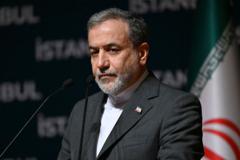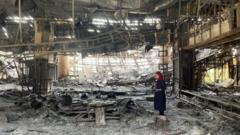The situation escalates as Iran distances itself from nuclear negotiations and critiques U.S. interventions, even as reports of casualties mount.
**Iranian Official Confirms Severe Damage to Nuclear Facilities Amid Ongoing Tensions**

**Iranian Official Confirms Severe Damage to Nuclear Facilities Amid Ongoing Tensions**
Iran's foreign minister acknowledges significant harm to nuclear sites following recent bombings, challenging official narratives of resilience.
Iran's foreign minister, Abbas Araghchi, has publicly recognized "excessive and serious" damage inflicted on Iran's nuclear facilities due to the recent bombings conducted by the United States and Israel. Speaking with state television, Araghchi indicated that the Atomic Energy Organisation of Iran is currently assessing the extent of the destruction. This admission starkly contrasts the earlier statement from Iran's Supreme Leader, Ayatollah Ali Khamenei, who claimed that the bombings had not disrupted the country's nuclear ambitions—calling U.S. President Donald Trump's comments about total destruction "exaggerated."
Khamenei, emerging from a notable period of seclusion since the onset of hostilities with Israel on June 13, declared that the U.S. strikes had not yielded significant results. In a notable shift in rhetoric, Araghchi stated unequivocally that there would be no immediate resumption of nuclear talks with the United States. Iran had previously suspended negotiations when Israel commenced its aerial assaults.
Emphasizing a new diplomatic strategy, Araghchi informed the public that the Iranian government is re-evaluating its approach based on the interests of its citizens. He did not elaborate on what this new diplomatic form would entail. Meanwhile, the Trump administration is exploring ways to entice Iran back to the negotiation table by proposing assistance of $30 billion for the construction of a civilian nuclear energy program, coupled with sanction relief and access to previously frozen Iranian funds.
However, legislative developments within Iran may pose obstacles to these diplomatic overtures. Recently, the Iranian parliament passed a bill aimed at ceasing cooperation with the International Atomic Energy Agency (IAEA), signaling a potential withdrawal from allowing nuclear inspections at designated sites.
The offensive orchestrated by Israel is justified by its government on the grounds of thwarting Iran's alleged pursuit of nuclear weaponry, a claim Iran vehemently denies, asserting its nuclear program is solely for civilian purposes. The strikes believed to have targeted key sites in Fordo, Natanz, and Isfahan, were accompanied by an assertion from U.S. Defence Secretary Pete Hegseth regarding significant damage to the nuclear program, claiming this setback could delay its progress for years. However, a leaked preliminary assessment from the Pentagon contradicted this, suggesting that the program would only experience a minor delay.
As these geopolitical tensions rise, Iran's health ministry has reported casualties in the conflict, with 610 deaths attributed to Israeli airstrikes compared to 28 fatalities in Israel as a result of the ongoing strife. As Tehran grapples with the aftermath of military assaults and shifts in international relations, its citizens face a landscape increasingly marked by fear and uncertainty.





















